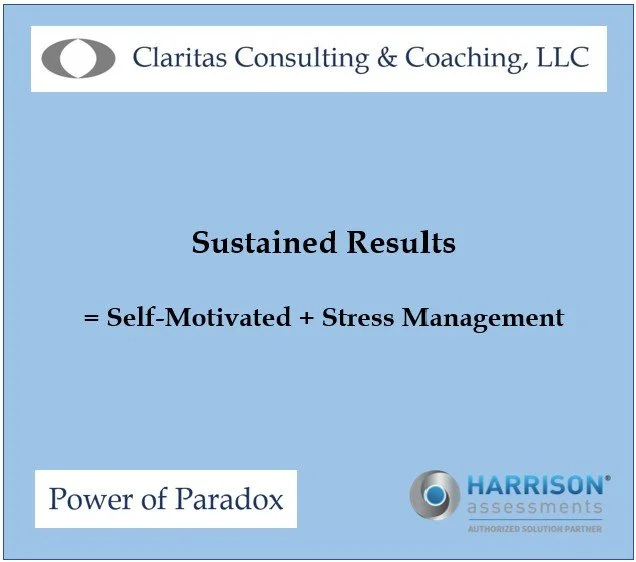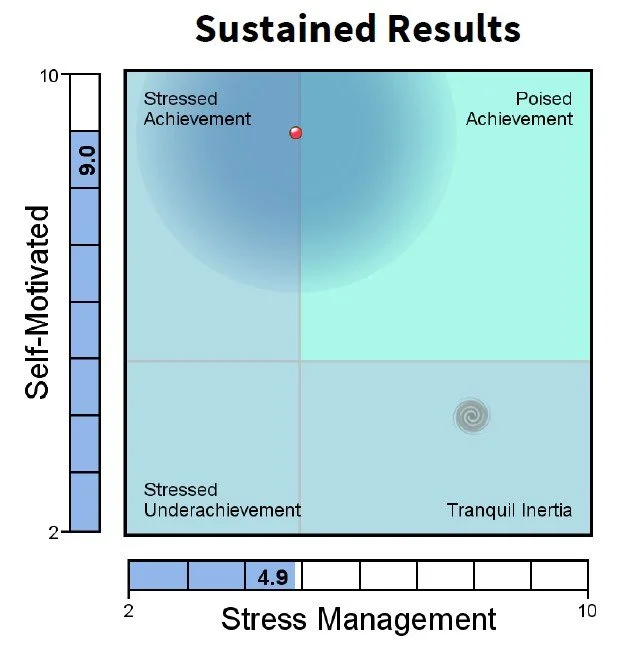Power of Paradox - Sustained Results
What happens to you when you are very stressed? If you are stressed, how long have you been stressed for and are you on the verge of burnout?
Or perhaps you have a team member that has been underperforming whom you are trying to motivate.
This year has been a stressful one for many people. Recently, I’ve encountered more people that are job-hunting and talked to a non-profit leader that has had their funding cut in half with no guarantee whether future grants will come through because the new grants that they are receiving come with a clause that they can be withdrawn at any time.
It’s very challenging to stay motivated and sustain results in this type of environment where there is so much uncertainty.
To sustain results, we need to be able to balance between staying motivated and being able to manage stress – this is a paradox.
Let’s unpack this paradox of Sustained Results and you’ll learn what you can do to develop it because when it is out of balance, that stress can physically take a toll on our bodies.
What is the Paradox of Sustained Results?
Dr. Dan Harrison, founder of Harrison Assessments defines sustained results as the tendency to be self-motivated while minimizing stress. His guidance for this paradox is that “by keeping a balanced life, the process of achieving a goal is as fulfilling as achieving the goal itself; no goal is truly fulfilled without quality of life”!
There are four possible combinations where someone’s behavioral preferences might land on this paradox:
- Stressed Underachievement
- Stressed Achievement
- Tranquil Inertia
- Poised Achievement
Poised achievement is a combination of being highly self-motivated AND able to manage stress which is what enables sustained results.
In this example, this person scores (red dot) place them right in between stressed achievement and poised achievement. The blue circle is meant to represent our typical range of behavior because we don’t show up exactly the same every day. So this person is at times able to sustain results, but other times may be feeling stressed because they are highly self-motivated but have only a moderate ability to manage stress.
What happens when self-motivation or stress management is low?
When both self-motivation and stress management are low, we have stressed underachievement. This looks like a team member who is under-performing and stressed out.
When self-motivation is low but stress management is high, this creates tranquil inertia.
Oftentimes people think about ability and motivation as if they are completely separate from each other but the two are linked. When someone does not feel like they have the ability to do something, they will not be motivated to work on it.
If you are a manager and have someone that appears to be unmotivated, one of the things to investigate is how they feel about their ability to do the task to see if additional training or coaching might help.
When self-motivation is high and stress management is low, this can create what is called a flip behavior, which is the grey hurricane symbol in the picture below. When someone is highly self-motivated is under stress but does not have a good way to cope with that stress, their stressed achievement becomes even more intense until they reach a point where their behavior temporarily “flips” to tranquil inertia.
As an example, someone might be putting in a lot of hours at work only to come home and sit in front of the TV all night to decompress. If they have responsibilities at home, childcare for example, over time this behavior may cause strain in the relationship between them and their partner.
Something else that can happen with extended high levels of stress is burnout. I’ve experienced burnout in the past but did not recognize the symptoms at the time. The World Health Organization categorized burnout as a “syndrome” resulting from “chronic workplace stress that has not been successfully managed” and describe it as:
Feelings of energy depletion or exhaustion.
Increased mental distance, negativism or cynicism related to one's job.
Reduced professional efficacy.
If you are getting sick more frequently than usual, pay attention because that is a warning sign from your body. To learn more about the powerful relationship that exists between the mind and body, I would recommend reading the book The Body Keeps the Score.
What are some ways you can improve your stress management?
In order to improve stress management, it’s important to pay attention to both your physical and mental health.
On the physical side, get sufficient sleep and exercise. Perhaps you’re thinking, “I’m so busy, I don’t have enough time to exercise or get more sleep.” There are ways to do this that don’t take much time and the benefits they provide outweigh the time required.
- On sleep side, short power naps (25 minutes or less) during the day have been proven to be an effective way to recharge your body and count as one sleep cycle (45 minutes). The key part to napping during the day is to keep it below 30 minutes, otherwise when you wake up you might feel groggy.
o NASA’s research found that pilots who napped 20-30 minutes were 50% more alert and 30% better at their jobs than pilots who didn’t nap!
- On the exercise side, short high-intensity circuit training (HICT) exercises of only 7 minutes per day have been shown to provide similar benefits to longer exercises. You can even do these at home!
On the mental side, build up your mental fitness and resilience through mindfulness exercises or PQ reps that you can do without the stillness and quiet required of meditation. What we are doing with mindfulness, PQ reps, or medication exercises is change the neutral pathways in our brain over time so that they are less likely to default to fight or flight responses when we are under stress. Carla Shatz coined the phrase neurons that fire together, wire together based on psychologist Donald Hebb’s work.
- The Headspace app is a great app that I’ve used for mindfulness
- Positive Intelligence is a six-week program to develop mental resilience
Claritas is proud to be a certified solutions provider for Harrison Assessments and Gloriana Teh is also a Positive Intelligence coach. If you would like to learn more about these programs, book a discovery call with us.
For updates on future blogs and paradoxical leadership resources, join Claritas’ newsletter using this link.
And if you find this article helpful, please share it with others!
This article is intended for informational and educational purposes only. It is not a substitute or replacement for medical or mental health advice. If you have any concerns, please consult with your physician, health care, or mental health professional.
This post may contain affiliate links, which means I’ll receive a commission if you purchase through my links, at no additional cost to you. Please read the full disclosure for more information.


